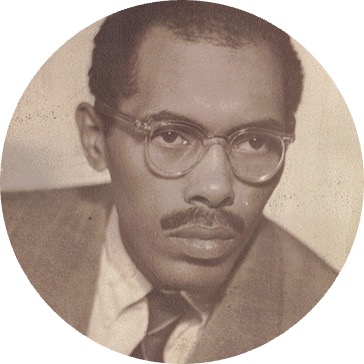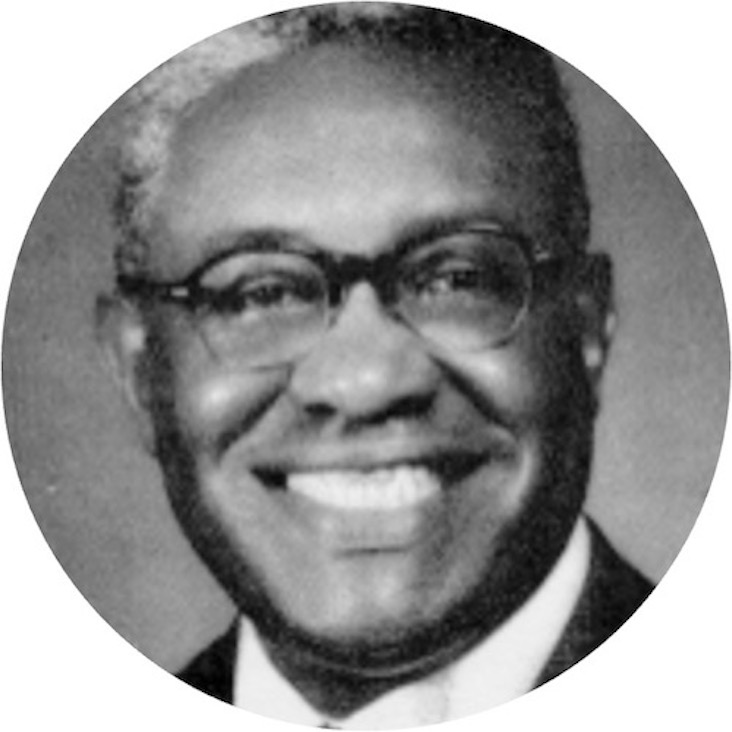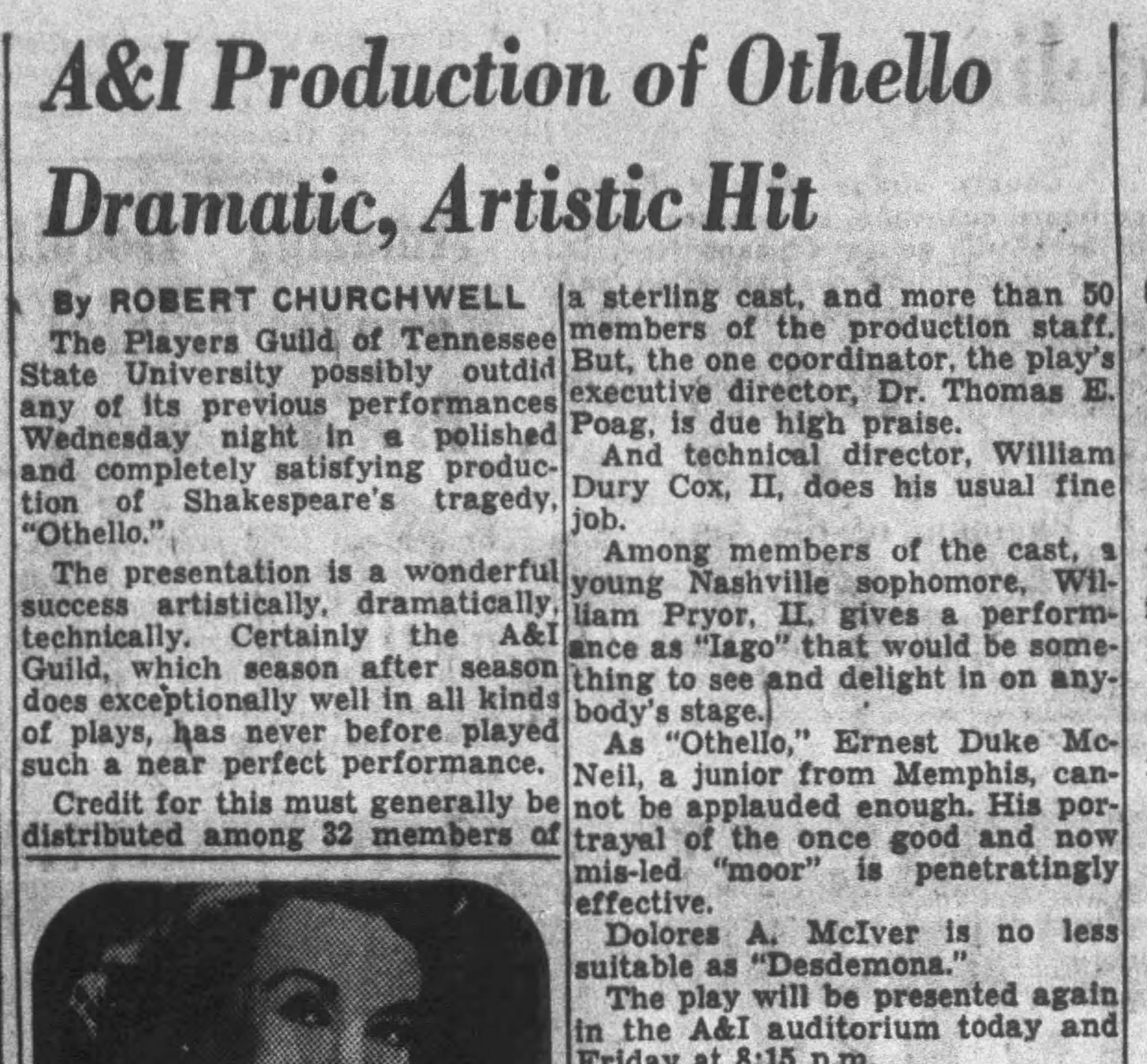In 1950, many states still had Jim Crow laws in effect, but African-Americans and other historically excluded populations had made many advancements toward greater inclusivity. In 1954, the supreme court ruled in Brown v. Board of education that segregation in schools was unconstitutional. This was the beginning of legal desegregation throughout America. It wasn’t until 1964 that President Lyndon B. Johnson signed the Civil Rights Act, making institutional segregation illegal in the U.S.
 Robert Churchwell, a graduate of Fisk University, was the first African-American journalist hired full time by The Nashville Banner, known as a conservative newspaper. He would go on to write many stories, including coverage of the Nashville sit-ins of the 1960s, when the youth of Nashville protested continued segregations at lunch counters by sitting in “whites-only” sections. The Banner refused to run his stories about the sit-ins. Because of his important work, Churchwell has received many honors, including having a school in Nashville named after him.
Robert Churchwell, a graduate of Fisk University, was the first African-American journalist hired full time by The Nashville Banner, known as a conservative newspaper. He would go on to write many stories, including coverage of the Nashville sit-ins of the 1960s, when the youth of Nashville protested continued segregations at lunch counters by sitting in “whites-only” sections. The Banner refused to run his stories about the sit-ins. Because of his important work, Churchwell has received many honors, including having a school in Nashville named after him.
Churchwell’s review of Othello mentions the director, Dr. Thomas E. Poag. According to Tennessee State University, Dr.Poag was “the first African-American in history to receive M.A. and Ph.D. Degrees in drama and theatre.” Dr.Poag, an actor, playwright, and professor, established TSU’s theater company and wrote three plays during his lifetime. Oprah Winfrey was one of his students.
 Dr. Poag was an expert on Black theater. His collection of papers at TSU contains speeches and writings on the topic, as well as newspaper clippings. In 1955, the year he produced Othello, he collected news from around the nation about the progress of integration. There are deep resonances between Othello, a play in which an African character struggles for acceptance in Venetian society, and the challenges to racial equality in the United States during this time.
Dr. Poag was an expert on Black theater. His collection of papers at TSU contains speeches and writings on the topic, as well as newspaper clippings. In 1955, the year he produced Othello, he collected news from around the nation about the progress of integration. There are deep resonances between Othello, a play in which an African character struggles for acceptance in Venetian society, and the challenges to racial equality in the United States during this time.
 Othello has played an important part in the representation of African identity on U.S. stages. Although the play is about an African character, in the 1700s and 1800s in the U.S., the character of Othello in professional productions was usually played by a white man in blackface. The first African-American actor known to play the part of Othello professionally was James Hewlett. Another African-American actor, Ira Aldridge, later became globally famous for his portrayals of Othello and other Shakespearean characters. Aldridge got his start on the stage of the African Grove Theatre in New York in the 1820s—the first major African-American theater in the United States. However, the theater faced fierce opposition, and Aldridge moved to London to pursue better career options. He performed an early production of Othello with an integrated cast in 1825 in England and remained in Europe throughout his life. Integrated productions of Othello continued to be rare in America until the 20th century, when the great Paul Robeson starred in Broadway’s first integrated version of the play in 1943. To read more about Shakespeare and African-American history, click here.
Othello has played an important part in the representation of African identity on U.S. stages. Although the play is about an African character, in the 1700s and 1800s in the U.S., the character of Othello in professional productions was usually played by a white man in blackface. The first African-American actor known to play the part of Othello professionally was James Hewlett. Another African-American actor, Ira Aldridge, later became globally famous for his portrayals of Othello and other Shakespearean characters. Aldridge got his start on the stage of the African Grove Theatre in New York in the 1820s—the first major African-American theater in the United States. However, the theater faced fierce opposition, and Aldridge moved to London to pursue better career options. He performed an early production of Othello with an integrated cast in 1825 in England and remained in Europe throughout his life. Integrated productions of Othello continued to be rare in America until the 20th century, when the great Paul Robeson starred in Broadway’s first integrated version of the play in 1943. To read more about Shakespeare and African-American history, click here.
Read through Robert Churchwell’s review below and notice the high praise he has for the actors and the production. How do you think this article about a Black production of Shakespeare in a newspaper read by a predominantly white audience might have supported integration in Nashville?

In the play, Othello is an African serving in the Venetian army. He falls in love with and marries the white Desdemona without her father’s consent but wins over both her father and the Venetian council. In the play, his lieutenant, the jealous Iago, manipulates Othello into believing that Desdemona has cheated on him. Iago isolates Othello and drives him to the brink of insanity. Othello finally murders Desdemona because of his suspicions.
Speak of me as I am. Nothing extenuate,
Nor set down aught in malice. Then must you speak
Of one that loved not wisely but too well
—Othello, Act 5 Scene 2
How do we know people “as they are”? How do you judge people when you first meet them? How do you know your judgements represent who they really are?
As a character, Othello is often criticized for his violence. But the program note from the 1955 production at TSU suggests that we can also feel compassion for a man unable to cope with the deception and treachery that surrounds him:
Only one who has never made a mistake can feel anything but sympathy for a great man who is mistaken so greatly and who suffers for it so greatly.
 Robert Churchwell, a graduate of Fisk University, was the first African-American journalist hired full time by The Nashville Banner, known as a conservative newspaper. He would go on to write many stories, including coverage of the Nashville sit-ins of the 1960s, when the youth of Nashville protested continued segregations at lunch counters by sitting in “whites-only” sections. The Banner refused to run his stories about the sit-ins. Because of his important work, Churchwell has received many honors, including having a school in Nashville named after him.
Robert Churchwell, a graduate of Fisk University, was the first African-American journalist hired full time by The Nashville Banner, known as a conservative newspaper. He would go on to write many stories, including coverage of the Nashville sit-ins of the 1960s, when the youth of Nashville protested continued segregations at lunch counters by sitting in “whites-only” sections. The Banner refused to run his stories about the sit-ins. Because of his important work, Churchwell has received many honors, including having a school in Nashville named after him. Dr. Poag was an expert on Black theater. His collection of papers at TSU contains speeches and writings on the topic, as well as newspaper clippings. In 1955, the year he produced Othello, he collected news from around the nation about the progress of integration. There are deep resonances between Othello, a play in which an African character struggles for acceptance in Venetian society, and the challenges to racial equality in the United States during this time.
Dr. Poag was an expert on Black theater. His collection of papers at TSU contains speeches and writings on the topic, as well as newspaper clippings. In 1955, the year he produced Othello, he collected news from around the nation about the progress of integration. There are deep resonances between Othello, a play in which an African character struggles for acceptance in Venetian society, and the challenges to racial equality in the United States during this time.
 Othello has played an important part in the representation of African identity on U.S. stages. Although the play is about an African character, in the 1700s and 1800s in the U.S., the character of Othello in professional productions was usually played by a white man in blackface. The first African-American actor known to play the part of Othello professionally was James Hewlett. Another African-American actor, Ira Aldridge, later became globally famous for his portrayals of Othello and other Shakespearean characters. Aldridge got his start on the stage of the African Grove Theatre in New York in the 1820s—the first major African-American theater in the United States. However, the theater faced fierce opposition, and Aldridge moved to London to pursue better career options. He performed an early production of Othello with an integrated cast in 1825 in England and remained in Europe throughout his life. Integrated productions of Othello continued to be rare in America until the 20th century, when the great Paul Robeson starred in Broadway’s first integrated version of the play in 1943. To read more about Shakespeare and African-American history, click
Othello has played an important part in the representation of African identity on U.S. stages. Although the play is about an African character, in the 1700s and 1800s in the U.S., the character of Othello in professional productions was usually played by a white man in blackface. The first African-American actor known to play the part of Othello professionally was James Hewlett. Another African-American actor, Ira Aldridge, later became globally famous for his portrayals of Othello and other Shakespearean characters. Aldridge got his start on the stage of the African Grove Theatre in New York in the 1820s—the first major African-American theater in the United States. However, the theater faced fierce opposition, and Aldridge moved to London to pursue better career options. He performed an early production of Othello with an integrated cast in 1825 in England and remained in Europe throughout his life. Integrated productions of Othello continued to be rare in America until the 20th century, when the great Paul Robeson starred in Broadway’s first integrated version of the play in 1943. To read more about Shakespeare and African-American history, click 